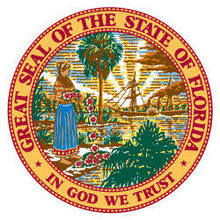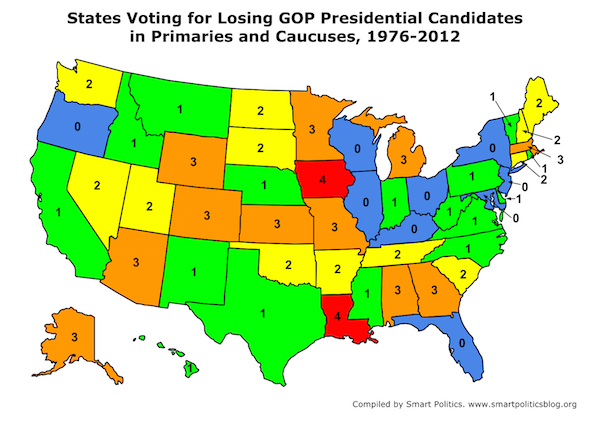Which States Own the Best Track Record in Backing Eventual GOP Presidential Nominees?
Nine states (each with primaries) have an unblemished record in voting for the eventual Republican nominee since 1976 – and not all host contests on the back end of the calendar

Of course, simply because a state holds its caucus or primary early in the year does not mean it ultimately becomes a kingmaker in deciding which candidate will become the nominee.
For the Republicans, the Iowa caucuses (and caucuses generally) are famous for supporting unsuccessful candidates: George H.W. Bush in 1980, Bob Dole in 1988, Mike Huckabee in 2008, and Rick Santorum in 2012.
New Hampshire’s first-in-the-nation primary has seen its voters back Republicans Pat Buchanan in 1996 and John McCain in 2000.
Meanwhile, South Carolina had long touted its status of voting for the eventual nominee of the Republican Party (though it did support Ronald Reagan in its 1976 caucuses) – a status that was officially nullified in 2012 after Newt Gingrich defeated Mitt Romney by a dozen points that January.
Nonetheless, there are still a few states that do own bragging rights when it comes to picking Republican presidential nominees – and not all hold their contests at the end of the calendar after candidates have been unofficially crowned the nominee weeks prior.
Smart Politics examined the last 10 election cycles dating back to 1976 and found that just nine states have backed the eventual Republican nominee in primaries or caucuses each time: Florida, Illinois, Kentucky, Maryland, New Jersey, New York, Ohio, Oregon, and Wisconsin (all primary states).
Florida is the most notable of these states as it has tended to hold its primary while the GOP nomination was still in doubt – particularly in recent cycles.
The Sunshine State’s primary was held in the second week of March from 1976 through the 2000 cycle and in the last week of January in 2008 and 2012. Overall, the state hosted one of the first five Republican primaries in 1976, 1980, 1988, 2008, and 2012.
(Primary dates from 1984 and 2004 are ignored in this analysis as incumbent Republican presidents did not face bona fide opposition in those cycles).
Along the way, Florida Republicans narrowly backed Gerald Ford over Ronald Reagan in 1976 by 5.6 points, John McCain over Mitt Romney in 2008 by 5.0 points, and Romney over Gingrich in 2012 by 14.5 points.
Illinois, meanwhile, has generally held its primary during the third week of March during this period, with the exception of 2008 when it moved up to Super Tuesday on February 5th.
Illinois gave Reagan an important 13-point victory over its home-state Congressman John Anderson in 1980 as well as helped to deliver knock-out blows to Romney in 2008 (by decisively backing McCain) and Santorum in 2012 (with Romney winning by 11.7 points).
Since 1976, Maryland, Wisconsin, and New York have held contests toward the front and back ends of the primary season.
Maryland’s Republican primary was among the first seven such contests in the country in 1988, 1992, 1996, and 2000 and between 15th and 21st in 1976, 1980, 2008, and 2012.
The narrowest victory by the eventual GOP nominee in the Old Line State came in 1980 when Reagan edged Bush by seven points with 48 percent of the vote.
Wisconsin, meanwhile, was one of the first 10 states to hold a Republican primary in 1976 and 1980, but outside of the Top 15 in 1988, 1992, 1996, 2000, 2008, and 2012.
The Badger State held fairly competitive GOP primaries three times during this period under analysis: Reagan beat Ford by 11 points in 1976, Reagan defeated Bush by 10 points in 1980, and Romney nipped Santorum by seven points in 2012.
New York was one of the first 10 states to hold its primaries in 1976, 1980, 2000, and 2008 and 15th or later in 1988, 1992, 1996, and 2012.
The Bush-McCain matchup in 2000 was competitive with the former winning by 7.6 points.
The Empire State, however, did not hold Republican presidential preference primaries (a direct vote for a specific candidate, or delegate committed to a specific candidate) until 1996. Prior to that, voters cast their ballots for delegates without their presidential candidate preference listed. (Ultimately, New York delegates backed the eventual GOP nominee during each of these cycles).
The remaining states of Kentucky, New Jersey, Ohio, and Oregon have generally held their primaries near the back end of the primary season. (With exceptions for Kentucky in 1988, New Jersey in 2008, and Ohio in 2000 and 2012).
Competitive races were held in Kentucky and Oregon in 1976 (with Ford defeating Reagan by four points in each) and Ohio in 2012 (with Romney beating Santorum by one point).
New Jersey has not yet hosted a competitive race.
Note: New Mexico has voted for the eventual GOP nominee in primaries for each cycle since 1980, but supported Reagan in its caucuses in 1976.
There have been 17 states that have backed one losing GOP candidate in a primary over the last 10 cycles:
● California, Idaho, Indiana, Montana, Nebraska, North Carolina, and Texas: Reagan over Ford in 1976
● Pennsylvania: Bush over Reagan in 1980
● Delaware: Steve Forbes over Dole in 1996
● Rhode Island and Vermont: McCain over Bush in 2000
● Utah: Romney over McCain in 2008
● West Virginia: Huckabee over McCain in 2008
● Mississippi, Missouri, and Oklahoma: Santorum over Romney in 2012
● South Carolina: Gingrich over Romney in 2012
Note: Missouri also backed Reagan in its 1976 caucuses and Buchanan in 1996. Oklahoma, South Carolina, and Utah also backed Reagan in their respective 1976 caucuses.
Seven states have voted for losing Republican candidates in primaries twice since 1976:
● Arizona: Forbes in 1996 and McCain in 2000
● Arkansas: Reagan in 1976 and Huckabee in 2008
● Connecticut: Bush in 1980 and McCain in 2000
● Louisiana: Huckabee in 2008 and Santorum in 2012
● New Hampshire: Buchanan in 1996 and McCain in 2000
● South Dakota: Reagan in 1976 and Dole in 1988
● Tennessee: Huckabee in 2008 and Santorum in 2012
Note: Arizona also backed Reagan in its 1976 caucuses. Louisiana caucus-goers supported Reagan in 1976 and Buchanan in 1996.
Four states have voted for losing candidates in primaries three times:
● Alabama: Reagan in 1976, Huckabee in 2008, and Santorum in 2012
● Georgia: Reagan in 1976, Huckabee in 2008, and Gingrich in 2012
● Massachusetts: Bush in 1980, McCain in 2000, and Romney in 2008
● Michigan: Bush in 1980, McCain in 2000, and Romney in 2008
Of the remaining dozen states that have exclusively or frequently utilized the caucus system to select GOP nominees since 1976, all have backed a losing candidate at least once:
● Iowa (4 times): Bush in 1980, Dole in 1988, Huckabee in 2008, and Santorum in 2012
● Alaska (3): Pat Robertson in 1988, Buchanan in 1996, and Romney in 2008
● Colorado (3): Reagan in 1976, Romney in 2008, and Santorum in 2012
● Kansas (3): Dole in 1988, Huckabee in 2008, and Santorum in 2012
● Minnesota (3): Dole in 1988, Romney in 2008, and Santorum in 2012
● Wyoming (3): Reagan in 1976, Dole in 1988, and Romney in 2008
● Maine (2): Bush in 1980 and Romney in 2008
● Nevada (2): Reagan in 1976 and Romney in 2008 (Note: Robertson ultimately won more delegates in 1988, but Bush had the most votes on precinct caucus day)
● North Dakota (2): Romney in 2008 and Santorum in 2012
● Washington (2): Reagan in 1976 and Robertson in 1988
● Hawaii (1): Robertson in 1988
● Virginia (1): Reagan in 1976
Note: The information above on caucus winners reflects the popular vote finish, not necessarily the ultimate majority/plurality delegate count (e.g. Ron Paul won a plurality of delegates in four caucus states last cycle: Iowa, Louisiana, Maine, and Minnesota).
Combining primaries and caucuses, Iowa and Louisiana are tied for the largest number of cycles supporting a losing Republican presidential candidate since 1976 at four cycles each.
Eleven states have done so three times: Alabama, Alaska, Arizona, Colorado, Georgia, Kansas, Massachusetts, Michigan, Minnesota, Missouri, and Wyoming.
Twelve states have done so twice: Arkansas, Connecticut, Maine, Nevada, New Hampshire, North Dakota, Oklahoma, South Carolina, South Dakota, Tennessee, Utah, and Washington.
And 16 states have done so in one cycle: California, Delaware, Hawaii, Idaho, Indiana, Mississippi, Montana, Nebraska, New Mexico, North Carolina, Pennsylvania, Rhode Island, Texas, Vermont, Virginia, and West Virginia.
Follow Smart Politics on Twitter.


Most of the energy of political work is devoted to correcting the effects of mismanagement of government.